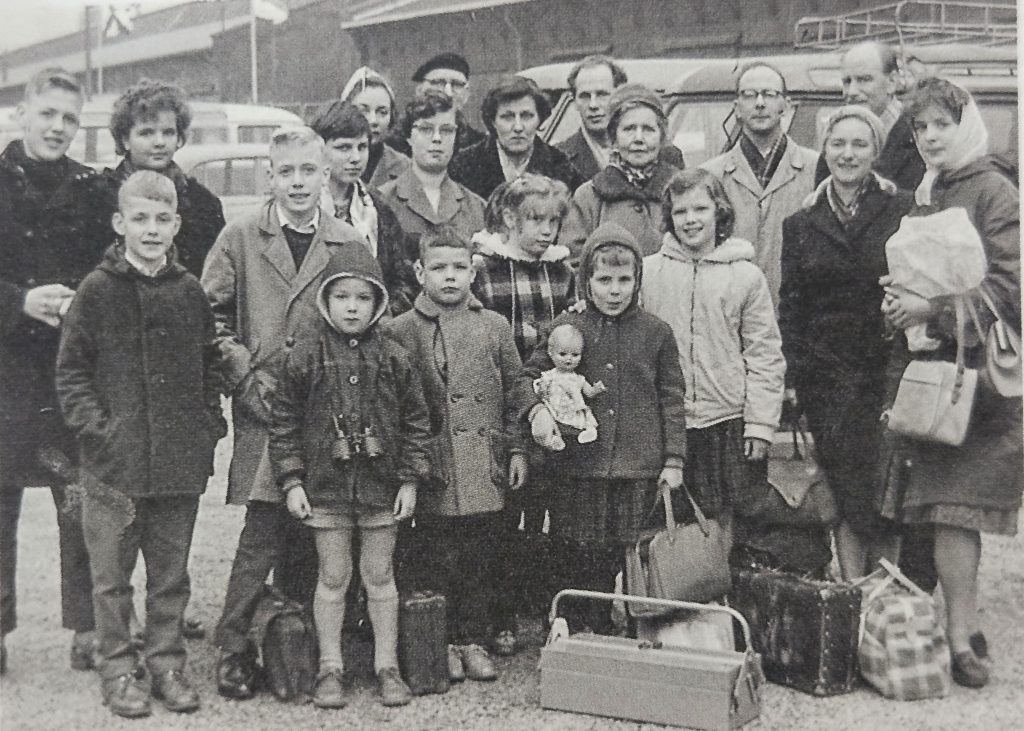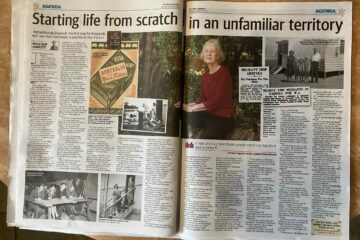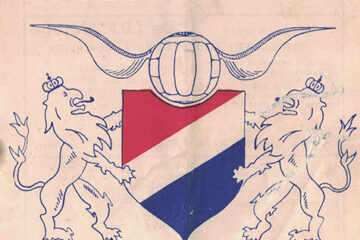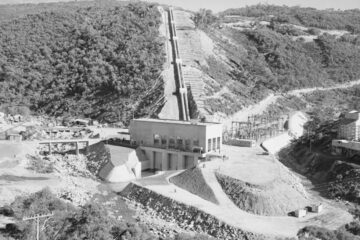This story is written by Maria Douwes and published in her book: Back to Australia.
The Douwes family was one of the last families to move from Amsterdam to Australia for a hundred guilders. Both the Australian and Dutch governments sponsored this trip.
On December 9, 1960, Maria Douwes emigrated to Australia with her parents, five brothers and four sisters. They sailed via the Azores to Curaçao, through the Panama Canal to Tahiti and via New Zealand to Sydney.
December 9, 1960
Departure from Amsterdam in 1960 On December 9th, 1960, my friend Lia Krijger and her father ac-company me to the Sumatrakade. I have stayed at her place for the last two weeks. They lived close to us in Slotermeer. Our house in de Hermanus Coenradistraat has been emptied a couple of weeks ago. Everything was packed in huge wooden crates. We were told that we don’t need any winter clothes in Australia but mom wants to take everything. On the Vlugtlaan we take tram number 13 to the Central Station and from there we take a ferry to the Javakade. We walk to the other side of the artificial island, where the Zuiderkruis’ is already moored at the SMN, the Stoomboot Maatschappij Nederland (the Steamship Company Netherlands). There I see my whole family waiting. My grandmother is there, my aunt Greta and my uncle Joseph. My big sisters Ineke, Simone and Connie are crying. And my mother a little as well. My brothers are acting tough and making jokes. We would never see our friends and family again, we were told. But I hope my grandmother will come and stay with is some time. She said she would try.

The big adventure awaits us. To Australia! We had heard a lot about it already. That there were kangaroos and koala bears, that the sun was always shining, that we had a few uncles and aunts there and that you could buy everything there by installment. That really appealed to me: you buy as many sweets as you want and pay for it later on. After having said our goodbyes, we board the ship.
We, the girls sleep in one cabin with mom and the five boys will sleep in another cabin on another deck with dad. We will eat together. At least, us five small ones because mom and dad and the big kids have another sitting. Then we have to go to the children’s deck. In IJmuiden at the locks our aunt Wies and uncle Han who live in Haarlem have come to say goodbye. They throw us a few big bags of liquorice. Nice for on the go.
December 13, 1960
The gong, a xylophone played by a Javanese, sounds through the loudspeakers announcing lunch. All the children under twelve eat together. We have the same table where Carla and Paul, twins, also sit. They are much smaller than we are, two years old, I think. With five brothers and sisters, Simon, Agnes, Chris, Joseph and I, we eat under surveillance of one of our older sisters, Simone. We have never been in a restaurant before and we are very impressed. Beautiful table linen, posh cutlery, napkins. We are being served by dark men. Simone says they speak Malay with each other. That’s what they speak in Indonesia. The djongo’s’ wear a white or striped coat. They serve us. The first and the second `mandoers’ wear a black suit and they are just looking to check if everything goes well. Sometimes they call a djongo and whisper something in their ear. We are asked, “What would you like to drink, coffee or tea?” You can also choose orange juice, buttermilk or ordinary milk. Even hot chocolate. There are buns on the table, slices of bread, crackers, ryebread or bread with raisins. You can take what you like from the ham, cheese, sausage, eggs, boiled or baked, chocolate sprinklers or jam and put as much as you like on your bread. Nobody minds.
December 14, 1960
All of a sudden, it’s summer! Everybody is outside on the decks. It is a very bright sunlight and there’s a pleasant breeze. Everyone is dressed in bright colours and straw hats. Agnes and I rush back to our cabin where mom, Ineke, Simone and Connie are already wearing shorts. All the crew is suddenly dressed in white uniforms and therefore they look much more handsome, I think. This morning there was boat drill for the crew that we had already practiced. Nothing to it. All you have to know is which sloop is yours and put on your life jacket. On this ship you can also go to the movies for free but it is so hot in there you almost suffocate. We’d rather play hide and seek and we’re getting better at it every day, especially when we have to go to bed, they can never find us. The older people are just sitting around all day and drinking coffee. So boring! At night there’s always dancing in the big lounge. If I was old enough, I would do that.
December 15, 1960
“My glasses, my glasses, where are my glasses!!!” I run from one part of the ship to the other. And once more I hear through the loudspeakers: “Attention, attention. A school of dolphins on port side.” Now, what was port again? Left or right? And where is the front of the ship? This morning we had lifeboat training and one of the officers explained to us where we had to be in case of emergency. At every lifeboat there should have been sixty people. At ours there were only ten.
Where on earth is my mother? My glasses must be in her handbag. On this side a lot of people are staring into the water but I don’t see anything. “This is starboard, ladies and gentlemen. The school of dolphins can be seen on the other side of the ship, “a man in uniform just said. Like crazy I open the nearest door and dash through the corridor behind the dining room to the other side. “Beautiful! Such graceful jumps! Just gorgeous!” Slowly, the passengers are walking away from the railing to find their own place again. I’m too late and I’m almost in tears!
After six days on board, we have already seen flying fish, porpoises, and dolphins. On the second day we saw the Chalk Cliffs of the English coast and a couple of days later the Azores. All of a sudden against the blue/green mountains we see white houses in the sunlight. At some points you see large rocks sticking out of the water. At coffee time this morning my father already told us that the Azores consist of nine islands that lie in the middle of the Atlantic Ocean but that they belong to Portugal. They are really extinct volcanoes. The highest volcano is the Pico on the island of the same name, which is 2.351 metres high. Some of the other islands are called Flores, Corvo and Santa Maria. Of course, I like the last one best, an island with my own name. Too bad we can’t go and see it now that we are that close. I would really like to see a volcano.
From my father’s diary December 22nd,1960
We looked around in Cristobal (Panama) by night. A messy town. Only the main streets have lanterns. The others only vague lights or nothing at all. From the harbour area you see wide sealed roads with enormous palm trees, where you can clearly see the coconuts. In the town it strikes us that most buildings have large verandas that are built all around the different floors. The living quarters are above the shops.
Everything is built to be ‘airy’. There’s hardly any light in the houses and here and there you see a Christmas tree with coloured lamps on a balcony or veranda. Everybody takes part in the ‘season’s greetings, even the fire brigade has a lightened greeting with coloured lamps and on the nicely cut grass next to it was a Christmas tree with lamps that went on and off.
A lot of newspaper ladies lie over their counters in their wooden huts, mostly asleep with their mouths open. Many bright coloured busses, like we used to see at circuses in Holland but here they race through the city like mad. The buses are filled with dark brown coloured people. The greengrocer’s also sells chickens; half of the shop is filled with cases and crates of all sizes and the turkeys walk around the shop with a rope around one of their feet. Cafes, cafe chants, dancehalls, everything is dimly lit with mainly coloured lights. A billiards hall with a granite floor, where locals were playing on a large billiard table. Lots of soliciting women who start talking to every foreigner. In the lighted main street, you see a lot of policemen, not big men, but still martial figures in khaki shorts with enormous caps and revolvers in their black and white stitched holsters, above a short baton in their belt. This baton looks pretty decent, with a cord on it with a lot of knots so it can be used as a whip too. You also see policemen on bicycles and both the policeman and his bike look impeccable.
At a large crossing a policeman regulates the traffic with one hand because in his other hand he’s holding an electro-megaphone, in which he shouts something now and then. This small device is as big as the loudspeakers on the Olympic stadium in Amsterdam, even though they are of very light material, they don’t look very practical. At my request the policeman demonstrated its use. The policemen greet each other as if they saw President Kennedy standing before them.
The policemen have a lot of interest for the female gender; here and there they enter a shop to chat to a sales lady and then continue on their way. One of them was walking in front of us and within a distance of 50 metres he had talked to a woman or a girl five times. Despite the many policemen and frequent warnings one of our female passengers, who was even accompanied by two gentlemen, was robbed of her camera worth 175 guilders.
Januari 4,1961
Tahiti! You can see it in the distance. Slowly the houses and the palm trees are getting bigger and slowly the cars and people become visible. We can smell the cocoa beans. “They are stored here in the warehouses,” my brother Hans says. Papeete is a natural harbour so it doesn’t take us much time to moor. All of a sudden, we hear a splash and screaming. “Man overboard, man overboard!!” It’s Piet, one of the crew members who couldn’t wait any longer as soon as he saw the hip swaying girls in hula skirts. My friend Paula explains his jump into the deep. “He wants to fuck.” I nod, but I don’t really understand what she means. I have heard the word before, but I don’t think it can be any good. Piet spends his two Tahitian days in jail and will never set foot on the island.
My father borrowed a book from Goofy and in the lounge after breakfast he reads to us: “Through James Cook’s expedition to Tahiti in 1768, with botanists, painters and astronomers to accompany him, the western world became acquainted with this very remote archipelago. The former queen Pomare IV was forced to accept the French Protectorate in 1842. In 1881 her son had to swallow the change into a French colony. Tahiti was named Otaheite before discovery and together with the other islands Moorea and Bora Bora, and a large group of islands of about one hundred and fifty larger and smaller islands, they form French Polynesia. These islands have a volcanic origin. The landscape is very diverse: next to scenic sandy beaches lined with palm trees we will see mountains and jungles.” Dad explains all the difficult words we don’t know. Dad, mum and all their ten children are going ashore. Some friends and crew members join us. Goofy says: “Papeete is the only place in the world where they don’t each porridge”(pap eten, sounds like Papeete, means to eat porridge in Dutch). Typical Goofy. He thinks he’s funny. The orchestra on the quay is playing while we walk down the gangway and the Tahitian girls are moving their hips in every direction as if they’re apart from their bodies. Their long raven black hair reaches their buttocks which they shake back and forth so you can hear their straw skirts sound like the wind is blowing through them. Not only the beautiful young girls are decorated with flowers in their hair and flower garlands around their necks but so are the boys and men. Everybody smiles at us and we feel welcome by this charming spectacle. My father said: “Now I understand why the crew of the Bounty committed mutiny. Some said it was because of captain Bligh being so cruel but others say that the beautiful Tahitian girls played a role. Some of the men didn’t want to go back to England at all. I can’t blame them.”
Gaugain and Matisse, a couple of French painters lived here back in the days, dad tells us. He also describes the travels of the writer Jack London who built his own ship in 1906, called her the Snark and set sail with his wife for a trip around the world. He visited Hawaii, the Merquesas, Tuamotu, Tahiti, Samoa and the Fiji Islands. I would have loved to go with him and his wife.
We stroll through the Chinese quarters where we see one textile shop after another. My mother chooses a dress, bright yellow with large, coloured flowers on it and the name Tahiti. A square neck on the front and the back of the dress. She tries it on while they put four folding screens around her. Not four Scots’ with a capital ‘S, (in Dutch schotten means screens) Goofy remarks, trying to be funny again.
The dress has to be taken in slightly, which is no problem because there’s a lady already sitting behind the sewing machine. Mum wants to wear the dress immediately and for years it will be her favourite.
A bit further down the street there’s a public washing facility in which you can shower in concrete cubicles with folding doors. Next to them are two large concrete basins. My dad says that the French inscription means that you can use detergent in one basin but not in the other.
The French soldiers that are stationed here apparently feel very much at home. You see kissing couples everywhere. Early next morning we go for a swim in the bay. It seems like the inhabitants of Tahiti have left the water for us because we don’t see any brown faces. But immediately after the ship’s steam whistle has blown and we leave the beach, the water is crowded with dark brown boys. “Maybe they think we have a contagious illness. The Dutch didn’t have such a good reputation amongst locals through the ages concerning their hygiene. “In Indonesia they also found that the Dutch stank,” mum says. She knows because she lived there.
On our way back to the ship, a man just gives us a whole trunk of bananas with about fifteen bunches on it. A pretty girl a little older than I, is busy harvesting mangos with a long stick. She drops one on the ground and when I pick it up and give it to her, she says: “C’est pour vous.” All the others get one too.
When the light in the cabin is turned off in the evening, I suddenly wake up from the screaming of Connie. “Spiders,” she’s yelling. Very soon we’re all out of bed and within a few minutes, Goofy comes storming into our cabin, he grabs the banana trunk and throws it through the porthole, straight overboard. The whole cabin is vacuum cleaned and in no time our beds are spider free again. After this adventure we all fall asleep soon.
January 14, 1961
Not long after we left Sydney behind us, I hear a shout: “Cowboys!” yes, indeed, I see three men with large hats galloping alongside of cows. Thousands of them. My father says: “There are more cows in Australia than people, seventeen million, against a more than ten million people.” The cows have to walk great distances to graze. At the top of the herd, we see more cowboys who we only know from the movies. train rides through the Great Dividing Range, a mountain chain that lies land inward, parallel to the coast. When it turns dark at 6.30, even though it’s in the middle of the summer, all you see are dark mountain tops and a vague red shining light that fades rapidly. Exhausted, we soon fall asleep on the wooden benches.
This story continues with their arrival at the Wacol Migrant Centre in Brisbane.


